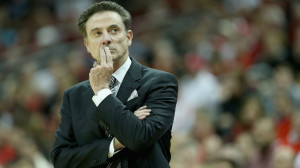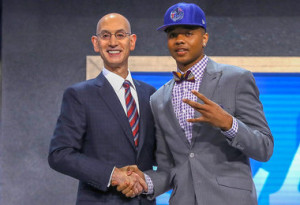Posted on
June 16, 2017 by
Dean Hybl

Thee NCAA punishment for Rick Pitino and Louisville is the latest inconsistency in justice from the NCAA.
The Intercollegiate Athletic Association of the United States (IAAUS) was created in 1906 by President Theodore Roosevelt primarily to oversee and make safer intercollegiate football as well as to oversee eligibility in intercollegiate sports. The name of the organization was changed in 1910 to the National Collegiate Athletic Association (NCAA).
Over the last 111 years, this organization has grown to become one of the most hypocritical behemoths within the United States. Though considered a non-profit, the NCAA generates billions of dollars in revenue annually while their primary labor force receives no direct compensation from the association. To make it even worse, those “student-athletes” are penalized by the organization if they dare to attempt to receive anything other than a college scholarship and minimal gifts and awards for participating in tournaments or championship competition.
I could spend thousands of words illustrating examples of the hypocrisy and exploitative nature of the organization, especially when it comes to student-athletes. But, I do not intend to make that the subject of this column.
Instead, I want to briefly explore the announcement this week of penalties against the Louisville Cardinals men’s basketball program and head coach Rick Pitino.
The NCAA is investigating what ineligible players may have appeared in games for the Cardinals from 2010-2014 as part of an alleged sex-for-pay scandal involving a Louisville assistant coach and basketball recruits. If any players were deemed to have performed while they should have been ineligible, then Louisville could be forced to vacate victories, including their 2013 NCAA Championship.
Though he has not been directly implicated, head coach Rick Pitino was suspended by the NCAA for five ACC games next season.
Now, don’t get me wrong, if a Louisville coach was involved in paying women to have sexual relations with basketball recruits, that is morally abysmal and just another example of how some in college athletics have crossed the line. However, much like the Penn State scandal of a few years ago where the university and football administration were without question guilty of failing to meet simple ethical standards, they weren’t necessarily guilty of anything that specifically provided the team with an on-the-field advantage by providing a special benefit or keeping a player eligible.
That lies in very deep contrast to the University of North Carolina, whose men’s basketball team won the NCAA Championship just two months ago. The University and many athletic teams, including the men’s basketball program, have been under the cloud of an academic scandal in which the credibility of an entire department at the college was fabricated for many years, in part to help ensure that student-athletes could remain eligible.
Yet, not only was UNC allowed to participate in the last two national championship games, their head coach, Roy Williams, is regularly lauded by the NCAA and coaches association for his “ethical” behavior.
There is an old saying that the NCAA is so upset with the actions at UNC that they put UNC-Wilmington on probation for ten years. In this case, it almost seems that the NCAA is working with the University to try and make the entire issue go away. It is a stark contrast to how the NCAA handles much less significant scandals at other institutions. Read the rest of this entry →
 Over 3.5 million sport participants are injured every year. If a person has multiple concussions, it may make simple tasks such as driving to the grocery store or remembering someone’s name difficult or impossible. A concussion can have serious effects on a person’s health both now and well into the future. Concussions and brain trauma are becoming more common, with 79% of deceased football players having CTE (chronic traumatic encephalopathy.) Therefore, it is important for an athlete to understand how to either avoid a concussion or how to overcome one that has already occurred.
Over 3.5 million sport participants are injured every year. If a person has multiple concussions, it may make simple tasks such as driving to the grocery store or remembering someone’s name difficult or impossible. A concussion can have serious effects on a person’s health both now and well into the future. Concussions and brain trauma are becoming more common, with 79% of deceased football players having CTE (chronic traumatic encephalopathy.) Therefore, it is important for an athlete to understand how to either avoid a concussion or how to overcome one that has already occurred.







